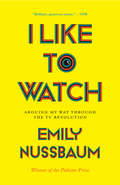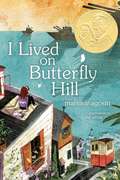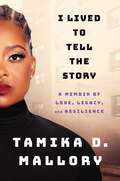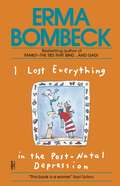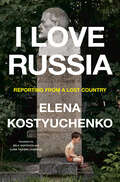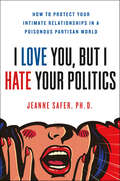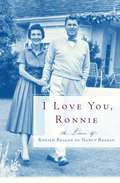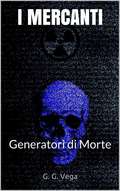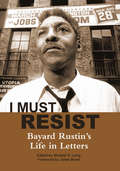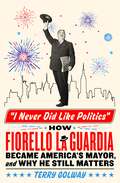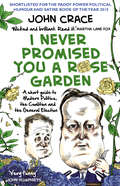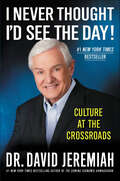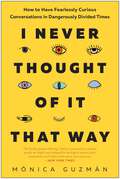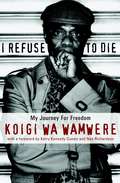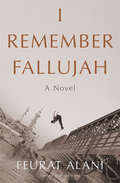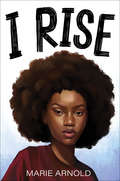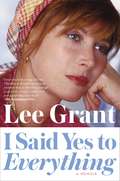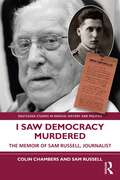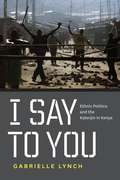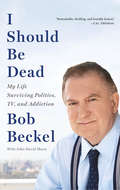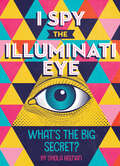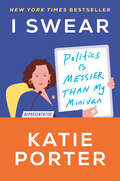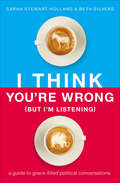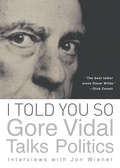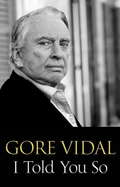- Table View
- List View
I Like to Watch: Arguing My Way Through the TV Revolution
by Emily NussbaumFrom The New Yorker’s fiercely original, Pulitzer Prize-winning culture critic, a provocative collection of new and previously published essays arguing that we are what we watch.“Emily Nussbaum is the perfect critic—smart, engaging, funny, generous, and insightful.”—David Grann, author of Killers of the Flower Moon From her creation of the “Approval Matrix” in New York magazine in 2004 to her Pulitzer Prize–winning columns for The New Yorker, Emily Nussbaum has argued for a new way of looking at TV. In this collection, including two never-before-published essays, Nussbaum writes about her passion for television, beginning with Buffy the Vampire Slayer, the show that set her on a fresh intellectual path. She explores the rise of the female screw-up, how fans warp the shows they love, the messy power of sexual violence on TV, and the year that jokes helped elect a reality-television president. There are three big profiles of television showrunners—Kenya Barris, Jenji Kohan, and Ryan Murphy—as well as examinations of the legacies of Norman Lear and Joan Rivers. The book also includes a major new essay written during the year of #MeToo, wrestling with the question of what to do when the artist you love is a monster.More than a collection of reviews, the book makes a case for toppling the status anxiety that has long haunted the “idiot box,” even as it transformed. Through it all, Nussbaum recounts her fervent search, over fifteen years, for a new kind of criticism, one that resists the false hierarchy that elevates one kind of culture (violent, dramatic, gritty) over another (joyful, funny, stylized). I Like to Watch traces her own struggle to punch through stifling notions of “prestige television,” searching for a more expansive, more embracing vision of artistic ambition—one that acknowledges many types of beauty and complexity and opens to more varied voices. It’s a book that celebrates television as television, even as each year warps the definition of just what that might mean.Advance praise for I Like to Watch“This collection, including some powerful new work, proves once and for all that there’s no better American critic of anything than Emily Nussbaum. But I Like to Watch turns out to be even greater than the sum of its brilliant parts—it’s the most incisive, intimate, entertaining, authoritative guide to the shows of this golden television age.”—Kurt Andersen, author of Fantasyland“Reading Emily Nussbaum makes us smarter not just about what we watch, but about how we live, what we love, and who we are. I Like to Watch is a joy.”—Rebecca Traister
I Lived on Butterfly Hill: A Novel (The Butterfly Hill Series)
by Marjorie AgosinAn eleven-year-old&’s world is upended by political turmoil in this &“lyrically ambitious tale of exile and reunification&” (Kirkus Reviews) from an award-winning poet, based on true events in Chile.Celeste Marconi is a dreamer. She lives peacefully among friends and neighbors and family in the idyllic town of Valparaiso, Chile—until one day when warships are spotted in the harbor and schoolmates start disappearing from class without a word. Celeste doesn’t quite know what is happening, but one thing is clear: no one is safe, not anymore. The country has been taken over by a government that declares artists, protestors, and anyone who helps the needy to be considered “subversive” and dangerous to Chile’s future. So Celeste’s parents—her educated, generous, kind parents—must go into hiding before they, too, “disappear.” Before they do, however, they send Celeste to America to protect her. As Celeste adapts to her new life in Maine, she never stops dreaming of Chile. But even after democracy is restored to her home country, questions remain: Will her parents reemerge from hiding? Will she ever be truly safe again? Accented with interior artwork, steeped in the history of Pinochet’s catastrophic takeover of Chile, and based on many true events, this multicultural ode to the power of revolution, words, and love is both indelibly brave and heartwrenchingly graceful.
I Lived to Tell the Story: A Memoir of Love, Legacy, and Resilience
by Tamika D. MalloryA raw, heartfelt memoir of perseverance, redemption, and triumph from Tamika D. Mallory, trailblazing social justice leader, activist, and cofounder of the Women&’s March. In I Lived to Tell the Story, Tamika Mallory takes us beyond the headlines and podiums, offering an unfiltered look at the moments that shaped her—not just as an activist but as a woman navigating love, loss, and self-discovery. From her early days as the daughter of civil rights organizers in Harlem to her battles with the personal pain that many never imagined—the trauma of sexual assault, the pressures of motherhood, the fallout of public scrutiny, and the fight to reclaim her peace—this is Tamika as the world has never seen her before. A follow-up to her &“masterful&” (Marc Lamont Hill) debut, State of Emergency, which confronted the murders of Breonna Taylor and George Floyd, this memoir ventures deeper into her journey. Tamika shares untold stories of resilience, courage, and internal struggles while waging war against injustice in America. At its core, I Lived to Tell the Story is not just about activism; it&’s about what happens after the smoke clears. It&’s about healing, survival, and the power of truth to bring us closer to ourselves and one another.
I Lost Everything in the Post-Natal Depression
by Erma BombeckErma Bombeck has learned a few things about children and family over the years--and in a way that is uniquely and wonderfully her own, she shares everything she knows with her readers. Whether it's cleaning up after the kids and him, or expendable mothers-in-law, Erma Bombeck gets to the heart of the matter and makes us laugh through our tears.From the Trade Paperback edition.
I Love Russia: Reporting from a Lost Country
by Elena Kostyuchenko"Elena Kostyuchenko is an important guide to the 21st century." —Timothy Snyder, author of The Road to Unfreedom"A fascinating, frightening, compulsively readable chronicle of life in Putin's Russia.... Her stories are unforgettable, and deeply important.&” ― Carol Off, author of All We Leave Behind &“Would you like to know where Putin comes from? What the Russians are like today? And why? Read this book." ― Svetlana Alexievich, winner of the Nobel Prize in LiteratureTo be a journalist is to tell the truth.I Love Russia is Elena Kostyuchenko's fearless attempt to document Putin's Russia as experienced by those it systematically and brutally erases: village girls recruited into sex work, queer people in the outer provinces; patients and doctors in a Ukrainian maternity ward; and reporters like herself, at risk not only because of her work but because she lived openly as a queer woman and LGBTQ activist in a deeply homophobic state. It takes us to places that non-Russians have never seen and brings us voices we have never heard.At once uncompromising and deeply humane, her book stitches together reportage and personal essays into a kaleidoscopic, often otherworldly journey. Here is Russia as it is, not as we imagine it.I Love Russia may be the last work from her homeland Kostyuchenko will publish for a long time—perhaps ever. She writes as she does, because she is driven by the conviction that the greatest form of love and patriotism is criticism. And because the threat of Putin's Russia extends beyond herself, beyond Crimea and beyond Ukraine.
I Love You, But I Hate Your Politics: How to Protect Your Intimate Relationships in a Poisonous Partisan World
by Jeanne SaferDo you thrust unsolicited partisan articles upon your spouse? Are you convinced that you can change your coworker’s mind, if you could only argue forcefully enough? Have you gone from befriending to “defriending” the people once closest to you? Don’t give up hope; Dr. Jeanne Safer is here to help.Since the election of Donald J. Trump, political disagreements have been ravaging our personal relationships like never before. This already widespread phenomenon will continue to grow unless we learn to fight it.From friends to relatives to lovers, no relationship is immune to this crisis. I Love You, but I Hate Your Politics draws from interviews with every type of politically mixed couple, as well as Dr. Safer’s own experiences as a die-hard liberal happily married to a stalwart conservative. The result is a practical guide to maintaining respect and intimacy in our increasingly divided world.I Love You, but I Hate Your Politics is sure to educate and entertain anyone who has felt the strain of ideological differences in their personal life. No matter which side of the fence you're on, Dr. Safer offers frank, practical advice for salvaging and strengthening your bonds with your loved ones. This book is required reading for any politically minded friend, relative, or significant other in the Trump era.
I Love You, Ronnie
by Nancy ReaganNo matter what else was going on in his life or where he was--travelling to make movies for G.E., in the California governor's office, at the White House, or on Air Force One, and sometimes even from across the room--Ronald Reagan wrote letters to Nancy Reagan, to express his love, thoughts, and feelings, and to stay in touch. Through letters and reflections, the characters, personalities, and private lives of a president and his first lady are revealed. Nancy Reagan comments on the letters and writes with love and insight about her husband and the many phases of their life together.
I Mercanti
by Guido Galeano Vega Flaminia MiragliaIl proposito di questo libro è rendere consapevole la società, capire e fare tesoro dell'importanza e del valore della vita. È l'umile contributo di questo scritttore emergente. L’educazione appropriata dei valori sociali umani è la priorità nel mondo. Coloro che amministrano e guidano l’economia mondiale, consciamente o inconsciamente, in maniera intenzionale o meno, sono focalizzati sull’industria della morte nel pianeta. Questo si può percepire per tutti gli eventi violenti che la nostra generazione, presumibilmente evoluta, ha sofferto. In un secolo sono stati spesi milioni e milioni in risorse, e sono state uccise milioni e milioni di persone nel pieno della loro età. Apparentemente, una parte dell’umanità ha perso l’amore per la vita, e si sta gettando tra le braccia della morte, come servo volontario per uccidere. Coloro che uccidono sono coloro che fanno in modo che la società non possa ricevere i frutti positivi della produttività globale. Sono coloro che accumulano i frutti dello sforzo e del sacrificio degli altri. Coloro che uccidono sono coloro che investono le risorse del pianeta nell’industria della morte.
I Must Resist: Bayard Rustin's Life in Letters
by Julian Bond Michael G. Long Bayard RustinPublished on the centennial of his birth, and in anticipation of the 50th anniversary of the historic March on Washington, here is Bayard Rustin's life story told in his own words.<P> Bayard Rustin has been called the "lost prophet" of the civil rights movement. A master strategist and tireless activist, he is best remembered as the organizer of the 1963 March on Washington, one of the largest nonviolent protests ever held in the U.S. He brought Gandhi's protest techniques to the American civil rights movement and played a deeply influential role in the life of Martin Luther King, Jr., helping to mold him into an international symbol of nonviolence.<P> Despite these achievements, Rustin often remained in the background. He was silenced, threatened, arrested, beaten, imprisoned and fired from important leadership positions, largely because he was an openly gay man in a fiercely homophobic era.<P> Here we have Rustin in his own words in a collection of over 150 of his letters; his correspondents include the major progressives of his day -- for example, Eleanor Holmes Norton, A. Philip Randolph, Roy Wilkins, Ella Baker, and of course, Martin Luther King, Jr.Bayard Rustin's eloquent, impassioned voice, his ability to chart the path "from protest to politics," is both timely and deeply informative. As the Occupy movement ushers America into a pivotal election year, and as politicians and citizens re-assess their goals and strategies, these letters provide direct access to the strategic thinking and tactical planning that led to the successes of one of America's most transformative and historic social movements.
I Never Did Like Politics: How Fiorello La Guardia Became America's Mayor, and Why He Still Matters
by Terry Golway"In our current dismal passage of American politics, it’s exhilarating to read about a politician who exemplified all the qualities—courage, honesty, vision, energy, disdain for hypocrisy, concern for the downtrodden—that we were taught to revere....Remarkable." —Wall Street JournalFiorello LaGuardia was one of the twentieth century’s most colorful politicians—on the New York and national stage. He was also quintessentially American: the son of Italian immigrants, who rose in society through sheer will and chutzpah. Almost one hundred years later, America is once again grappling with issues that would have been familiar to the Little Flower, as he was affectionately known. It’s time to bring back LaGuardia, argues historian and journalist Terry Golway, to remind us all what an effective municipal officer (as he preferred to call himself) can achieve...Golway examines LaGuardia’s extraordinary career through four essential qualities: As a patriot, a dissenter, a leader, and a statesman. He needed them all when he stood against the nativism, religious and racial bigotry, and reactionary economic policies of the 1920s, and again when he faced the realities of Depression-era New York and the rise of fascism at home and abroad in the 1930s. Just before World War II, the Roosevelt administration formally apologized to the Nazis when LaGuardia referred to Hitler as a “brown-shirted fanatic.”There was nobody quite like Fiorello LaGuardia. In this immensely readable book, as entertaining as the man himself, Terry Golway captures the enduring appeal of one of America’s greatest leaders.
I Never Promised You a Rose Garden: A Short Guide to Modern Politics, the Coalition and the General Election
by John CraceExactly a week after the general election, two men – ‘Call me Dave’ and ‘Call me Nick’ – walked side by side into the rose garden of No. 10 Downing Street to give their first press-conference as Prime Minister and Deputy Prime Minister, looking for all the world like men in love. It was a romance in which people wanted to believe. But it was also one that people couldn't help but mistrust. Most unnerving, however, was the sense that they both couldn't quite believe their luck. Cameron: I can't believe it. All those people out there just for us ...Clegg: I know. It's mad, isn't it? I have to keep pinching myself as well.Cameron: Go on say it again ...Clegg: What?Cameron: Call me Prime Minister ...The storms the Dave and Nick partnership would have to face (same sex marriage, plebgate, triple dip recession, riots ...) were then unclear. Now, almost five years on, this up-to-the-minute portrait of Westminster and the forthcoming General Election exposes the realities of the Coalition, while offering an indispensible guide to a half-decade of madness:· * Foreign Policy - The new 'special relationship' - William Hague and Angelina Jolie· * The Economy - Osborne finally cracks it: boom in London; bust everywhere else.· * Immigration - should the entire population of Bulgaria pick strawberries for us?· * The Opposition - how Labour got the wrong Miliband. Includes:* UKIP, PPI, ISIS and other dubious acronyms.· * The countdown to the General Election 2015: five years of planning since the last one.Insightful, painful, very funny, this is a must-read for all of us with a vote, whichever side we thought we were on.
I Never Thought I'd See the Day!: Culture at the Crossroads
by David JeremiahIs Western civilization in an accelerating decline? And if it continues will it eventually weaken and cause us to come to the end of cultured civilization as we now know it? "Yes," says David Jeremiah, and in his book, I Never Thought I'd See the Day! he details numerous signs of this cultural decay including: America held hostage by Iran Marriage becoming obsolete Creeping socialism The invisibility of culture's enemies Increase in "spiritual warfare" America turning its back on Israel Atheist attack on religionCan this downward spiral be reversed? Yes, but only if one person at a time returns to God with our heart, our manner of life, our dedication to genuine worship of God, in serving God by helping others, in our giving, and in prayer.
I Never Thought of It That Way: How to Have Fearlessly Curious Conversations in Dangerously Divided Times
by Mónica GuzmánPORCHLIGHT BOOKS JUNE 2022 NONFICTION BESTSELLER "Assigned reading for fractured families aspiring to a harmonious Thanksgiving dinner." —New York Times "Anyone who sincerely wants to bridge the gaps in understanding will appreciate this book." —Manhattan Book Review Learn how to bring curiosity and courage to even the most difficult conversations across America&’s polarized political divide with these actionable tools for navigating challenging disagreements. Journalist Mónica Guzmán is the loving liberal daughter of Mexican immigrants who voted—twice—for Donald Trump. When the country could no longer see straight across the political divide, Mónica set out to find what was blinding us and discovered the most eye-opening tool we&’re not using: our own built-in curiosity. Partisanship is up, trust is down, and our social media feeds make us sure we&’re right and everyone else is ignorant (or worse). But avoiding one another is hurting our relationships and our society. In this timely, personal guide, Mónica, the chief storyteller for the national cross-partisan depolarization organization Braver Angels, takes you to the real front lines of a crisis that threatens to grind America to a halt—broken conversations among confounded people. She shows you how to overcome the fear and certainty that surround us to finally do what only seems impossible: understand and even learn from people in your life whose whole worldview is different from or even opposed to yours. Drawing from cross-partisan conversations she&’s had, organized, or witnessed everywhere from the echo chambers on social media to the wheat fields in Oregon to raw, unfiltered fights with her own family on election night, Mónica shows how you can put your natural sense of wonder to work for you immediately, finding the answers you need by talking with people—rather than about them—and asking the questions you want, curiously. In these pages, you&’ll learn: How to ask what you really want to know (even if you&’re afraid to) How to grow smarter from even the most tense interactions, online or off How to cross boundaries and find common ground—with anyone Whether you&’re left, right, center, or not a fan of labels: If you&’re ready to fight back against the confusion, heartbreak, and madness of our dangerously divided times—in your own life, at least—Mónica&’s got the tools and fresh, surprising insights to prove that seeing where people are coming from isn&’t just possible. It&’s easier than you think.
I Refuse to Die: My Journey For Freedom
by Kerry Kennedy Nan Richardson Koigi Wa WamwereAn extraordinary account of how a laborer's son rose to challenge the power of despots, I Refuse to Die is both the autobiography of one gifted man who rose above the horrors of colonization, and an uncensored history of modern Kenya. The book is infused with the freedom songs of the Kenyan people, as well as dream prophecy and folk tales that are part of Kenya's rich storytelling tradition. Tracing the roots of the Mau Mau rebellion, wa Wamwere follows the evolution and degeneration of Jomo Kenyatta and the rise of Daniel arap Moi.In 1979, wa Wamwere won a seat in the parliament, where he represented the economically depressed Nakuru district for three years. An outspoken activist and journalist, wa Wamwere was framed and detained on three separate instances, spending thirteen years in prison, where he was tortured but not broken. His mother and others led a hunger strike to free him and fellow political prisoners. Their efforts brought about a show trial at which Koigi was sentenced to four more years in prison and "six strokes of the cane," and escaped Kenya--and probably execution--only through the exertions of human rights groups and the government of Norway.
I Remember Fallujah: A Novel
by Feurat AlaniIn this poignant first novel of memory, identity, and generational trauma, a child of political refugees tries to uncover the past his dying father kept secret, painting a powerful, layered portrait of Iraq from the 1950s to the 2000s.As a young man in the early 1970s, Rami fled his home to escape Saddam Hussein&’s dictatorship. In France, he built a new life and had a family, working hard to become a successful immigrant. He barely speaks of his time over there, and his son, Euphrates, feels it like a wall between them. When the now elderly Rami is hospitalized with a fatal cancer, Euphrates sees his last chance to learn more about this enigmatic man, and himself.Shifting between past and present, I Remember Fallujah brings to vivid life Rami&’s coming-of-age in a land devastated by violent conflict. His memories of the city, which became a stronghold for Hussein&’s Ba&’ath Party, reveal the courageous acts of resistance, as well as complex loyalties, of left-wing Iraqis fighting against a brutal Arab nationalist movement. And where Rami&’s amnesia has erased his exile, Euphrates seeks to fill in the gaps, with memories of his childhood in Paris, and visits to a changed Iraq that will unearth key facts.Inspired by Feurat Alani&’s own history, this unforgettable first novel is a moving tribute to the love between father and son that explores the nuances of the immigrant dream, and how we live with the family and country into which we were born.
I Rise
by Marie ArnoldA heartbreaking and powerful novel about racism and social justice as fourteen-year-old Ayo has to decide whether to take on her mother's activist role when her mom is shot by police. As she tries to find answers, Ayo looks to the wisdom of her ancestors and her Harlem community for guidance.Ayo's mother founded the biggest civil rights movement to hit New York City in decades. It’s called ‘See Us’ and it tackles police brutality and racial profiling in Harlem. Ayo has spent her entire life being an activist and now, she wants out. She wants to get her first real kiss, have a boyfriend, and just be a normal teen.When her mom is put into a coma after a riot breaks out between protesters and police, protestors want Ayo to become the face of See Us and fight for justice for her mother who can no longer fight for herself. While she deals with her grief and anger, Ayo must also discover if she has the strength to take over where her mother left off.This impactful and unforgettable novel takes on the important issues of inequality, systemic racism, police violence, and social justice.
I Said Yes to Everything
by Lee GrantBorn Lyova Haskell Rosenthal in New York City, actress Lee Grant spent her youth accumulating more experiences than most people have in a lifetime: from student at the famed Neighborhood Playhouse to member of the legendary Actors Studio; from celebrated Broadway star to Vogue "It Girl." At age twenty-four, she was nominated for an Academy Award for Detective Story, and a year later found herself married and a mother for the first time, her career on the rise. And then she lost it all. Her name landed on the Hollywood blacklist, her offers for film and television roles ground to a halt, and her marriage fell apart. Finding reserves of strength she didn't know she had, Grant took action against anti-Communist witch hunts in the arts. She threw herself into work, accepting every theater or teaching job that came her way. She met a man ten years her junior and began a wild, liberating fling that she never expected would last a lifetime. And after twelve years of fighting the blacklist, she was finally exonerated. With courage and style, Grant rebuilt her life on her own terms: first stop, a starring role on Peyton Place, and then leads in Valley of the Dolls, In the Heat of the Night, and Shampoo, for which she won her first Oscar. Set amid the New York theater scene of the fifties and the star-studded parties of Malibu in the seventies, I Said Yes to Everything evokes a world of political passion and movie-star glamour. Grant tells endlessly delightful tales of costars and friends such as Warren Beatty, Elizabeth Taylor, Grace Kelly, and Sidney Poitier, and writes with the verve and candor befitting such a seductive and beloved star.
I Saw Democracy Murdered: The Memoir of Sam Russell, Journalist (Routledge Studies in Radical History and Politics)
by Colin Chambers Sam RussellI Saw Democracy Murdered is the memoir of Sam Russell (1915–2010), a communist journalist and a British volunteer with the anti-fascist Republican forces in the Spanish Civil War. The book covers his experiences during the Spanish Civil War, his time as a journalist at The Daily Worker and The Morning Star newspapers, and his later disillusionment with Stalinism. In his capacity as a journalist, Russell travelled extensively and was frequently a front-row spectator at significant historical events, from the formerly occupied Channel Islands at the end of World War II to the show trials of communists in Eastern Europe in the 1950s. His report as Moscow correspondent on Nikita Khruschev’s ‘secret speech’ condemning the crimes of Stalinism was lacerated by his newspaper's editor, as was his interview with the legendary revolutionary leader, Che Guevara. Sam, whose friends included Donald Maclean, the British diplomat who spied for the Soviet Union during the Cold War, also reported from Budapest in 1956 and Prague in 1968 during the Warsaw Pact invasions of Hungary and Czechoslovakia, and from North Vietnam during the Vietnam War, and in 1973 he witnessed the assault on Chilean President Salvador Allende's palace that signalled the start of the CIA-backed military coup. Sam’s story was told to Colin Chambers and Chris Myant and has been edited by Colin Chambers. This autobiographical account of a fascinating life will be essential reading for scholars and activists with an interest in the Spanish Civil War, the history of communism, and British radical history.
I Say to You: Ethnic Politics and the Kalenjin in Kenya
by Gabrielle LynchIn 2007 a disputed election in Kenya erupted into a two-month political crisis that led to the deaths of more than a thousand people and the displacement of almost seven hundred thousand. Much of the violence fell along ethnic lines, the principal perpetrators of which were the Kalenjin, who lashed out at other communities in the Rift Valley. What makes this episode remarkable compared to many other instances of ethnic violence is that the Kalenjin community is a recent construct: the group has only existed since the mid-twentieth century. Drawing on rich archival research and vivid oral testimony, I Say to You is a timely analysis of the creation, development, political relevance, and popular appeal of the Kalenjin identity as well as its violent potential. Uncovering the Kalenjin’s roots, Gabrielle Lynch examines the ways in which ethnic groups are socially constructed and renegotiated over time. She demonstrates how historical narratives of collective achievement, migration, injustice, and persecution constantly evolve. As a consequence, ethnic identities help politicians mobilize support and help ordinary people lay claim to space, power, and wealth. This kind of ethnic politics, Lynch reveals, encourages a sense of ethnic difference and competition, which can spiral into violent confrontation and retribution.
I Should Be Dead: My Life Surviving Politics, TV, and Addiction
by Bob Beckel John D. MannFrom popular TV personality Bob Beckel, a deeply moving, redemptive memoir about his life as a political operative and diplomat, his long struggle with alcohol and drugs, and his unlikely journey to finding faith. Growing up poor in an abusive home, Bob Beckel learned to be a survivor: to avoid conflict, mask his feelings, and to lie--all skills that served him well in Washington, where he would become the youngest-ever Deputy Assistant Secretary of State and manage Walter Mondale's 1984 presidential campaign. But Beckel was living a double life. On January 20, 2001--George W. Bush's first Inauguration Day--he hit rock bottom, waking up in the psych ward. Written with captivating honesty, Beckel chronicles how his addictions nearly killed him until he found help in an unexpected ally, conservative Cal Thomas, who helped him find faith, get sober, and get his life back on track. Channel, The Five.
I Spy the Illuminati Eye: What's the Big Secret?
by Sheila KeenanEnlighten yourself with this fun guide to the all-powerful, all-knowing, all-seeing secret society.This irreverent, illustrated guide takes a look with an all-seeing, skeptical eye at the history and mystery of the cultural phenomenon that's got middle-school kids flashing finger triangles and scrutinizing dollar bills for signs of the Illuminati. It's the first pop culture companion to the shadowy group behind everything from the French Revolution to Jay-Z's fabulous rise. How did an eighteenth-century philosophical society infiltrate governments, banks, the media, the military, Hollywood, and hip-hop? . . . Or did they? Kids everywhere want to know who's in, who's not, and what all those signs, symbols, and secret rituals are really about.Is it all really real? Find out in this fun guide to all things illuminati.
I Swear: Politics Is Messier Than My Minivan
by Katie PorterAn honest, inspiring, and laugh-out-loud funny memoir about re-energizing our politics and standing up to corporate America—while carting three kids around in a minivan. <p><p> Never having run for office before, Katie Porter charted a new path in 2018 when she was elected to Congress as a Democrat in historically conservative Orange County, California. Underestimated as a single mom and chided for her progressive values, Katie defied expectations. Then, using her signature whiteboard, she began to take CEOs and corrupt government officials to task in Congressional hearings. The videos went viral, introducing Americans to her no-bullshit style, and making her a coveted guest on cable news and late-night television. <p><p>I SWEAR: Politics Is Messier Than My Minivan is a witty, down-to-earth exploration of what it&’s really like to serve in Congress, particularly as a single mom. Katie offers Americans a clear picture of what their elected leaders are doing—and how they’re doing it—exposing the gaps between politicians’ press conferences and real people’s lives. Katie reveals how her challenges as an Iowa farm girl diverted her to the Ivy League and how she came to see herself as a Californian, teaching law and raising three kids in Orange County. She shares why she made the jump from academia to politics and how she quickly mastered the art of making CEOs and cabinet members squirm when they bluff and bloviate instead of doing the job for America. With the same clarity she demonstrates in Congressional hearings, Katie makes the case for consumer protection, corporate accountability, and anti-corruption reforms. She pulls back the curtain on the political messaging machine, campaign fundraising, and Congress’ traditions, showing that the way things have always worked, in fact, does not work for a Congressperson without someone at home to do the shopping and take care of the kids. Along the way, she provides whiteboard lessons on where your campaign donations go, how to fight the corporations that cheat you, and how to conduct her trademark robust oversight. <p><P>Full of candid and inspiring stories—from how Katie lent Alexandria Ocasio-Cortez a pair of sneakers during the Capitol attack on January 6, 2021, to her kids’ lightly illegal campaign hijinks—this is a book by an exhausted, committed parent who just doesn’t have the time for nonsense in her house or in the House of Representatives. <p> <b>New York Times Bestseller</b>
I Think You're Wrong (But I'm Listening): A Guide to Grace-Filled Political Conversations
by Sarah Stewart Holland Beth SilversMore than ever, politics seem to be driven by discord. People sitting together in pews every Sunday feel like strangers and loved ones at the dinner table feel like enemies. Toxic political dialogue, hate-filled rants on social media, and agenda-driven news stories have become the new norm. But it doesn't have to be this way.In I Think You're Wrong (But I'm Listening), two working moms from opposite ends of the political spectrum teach us that politics don't have to divide us. Instead, we can bring the same care and respect to policy discussions that we bring to the rest of our lives.Sarah Stewart Holland and Beth Silvers, co-hosts of Pantsuit Politics, recently named an Apple Podcasts Show of the Year, give you all of the tools you need to:Respect the dignity of every personRecognize that issues are nuanced and can't be reduced to political talking pointsListen in order to understandLead with grace and patienceJoin Sarah from the left and Beth from the right as they teach you that people from opposing political perspectives truly can have calm, grace-filled conversations with one another.Praise for I Think You're Wrong (But I'm Listening):"Sarah and Beth are an absolute gift to our culture right now. Not only do they offer balanced perspectives from each political ideology, but they teach us how to dialogue well, without sacrificing our humanity."--Jen Hatmaker, New York Times bestselling author and speaker"Sarah from the left and Beth from the right serve as our guides through conflict and complexity, delivering us into connection. I wish every person living in the United States would read this compelling book, from the youngest voter to those holding the highest office."--Emily P. Freeman, Wall Street Journal bestselling author of The Next Right Thing
I Told You So: Gore Vidal Talks Politics
by Gore Vidal Jon Wiener"I exist to say, 'No, that isn't the way it is,' or 'What you believe to be true is not true for the following reasons.' I am a master of the obvious. I mean, if there's a hole in the road, I will, viciously, outrageously, say there's a hole in the road and if you don't fill it in you'll break the axle of your car. One is not loved for being helpful."Gore Vidal, one of America's foremost essayists, screenwriters, and novelists, died July 31, 2012. He was, in addition, a terrific conversationalist. Dick Cavett once described him as "the best talker since Oscar Wilde." And Vidal was never more eloquent, or caustic, than when let loose on his favorite topic, the history and politics of the United States.This book is made up from four interviews conducted with his long-time interlocutor, the writer and radio host Jon Wiener, in which Vidal grapples with matters evidently close to his heart: the history of the American Empire, the rise of the National Security State, and his own life in politics, both as a commentator and candidate.The interviews cover a twenty-year span, from 1988 to 2008, when Vidal was at the height of his powers. His extraordinary facility for developing an argument, tracing connections between past and present, and drawing on an encyclopedic knowledge of America's place in the world, are all on full display. And, of course, it being Gore Vidal, an ample sprinkling of gloriously acerbic one-liners is also provided.
I Told You So: Gore Vidal Talks Politics: Interviews with Jon Wiener
by Gore Vidal Jon Wiener"I exist to say, 'No, that isn't the way it is,' or 'What you believe to be true is not true for the following reasons.' I am a master of the obvious. I mean, if there's a hole in the road, I will, viciously, outrageously, say there's a hole in the road and if you don't fill it in you'll break the axle of your car. One is not loved for being helpful."Gore Vidal, one of America's foremost essayists, screenwriters, and novelists, died July 31, 2012. He was, in addition, a terrific conversationalist. Dick Cavett once described him as "the best talker since Oscar Wilde." And Vidal was never more eloquent, or caustic, than when let loose on his favorite topic, the history and politics of the United States.This book is made up from four interviews conducted with his long-time interlocutor, the writer and radio host Jon Wiener, in which Vidal grapples with matters evidently close to his heart: the history of the American Empire, the rise of the National Security State, and his own life in politics, both as a commentator and candidate.The interviews cover a twenty-year span, from 1988 to 2008, when Vidal was at the height of his powers. His extraordinary facility for developing an argument, tracing connections between past and present, and drawing on an encyclopedic knowledge of America's place in the world, are all on full display. And, of course, it being Gore Vidal, an ample sprinkling of gloriously acerbic one-liners is also provided.
